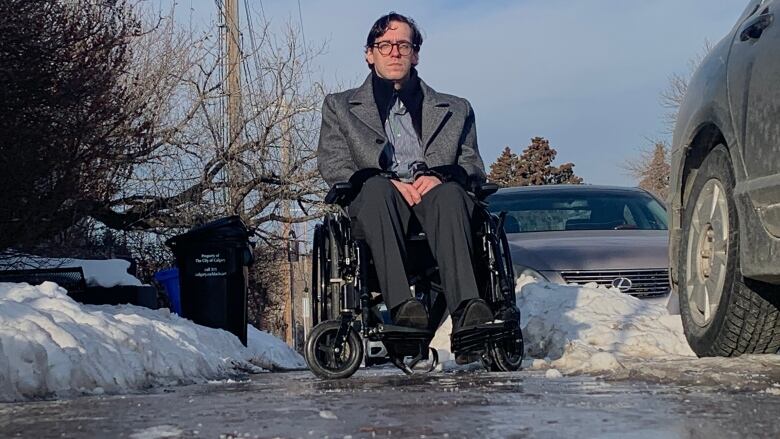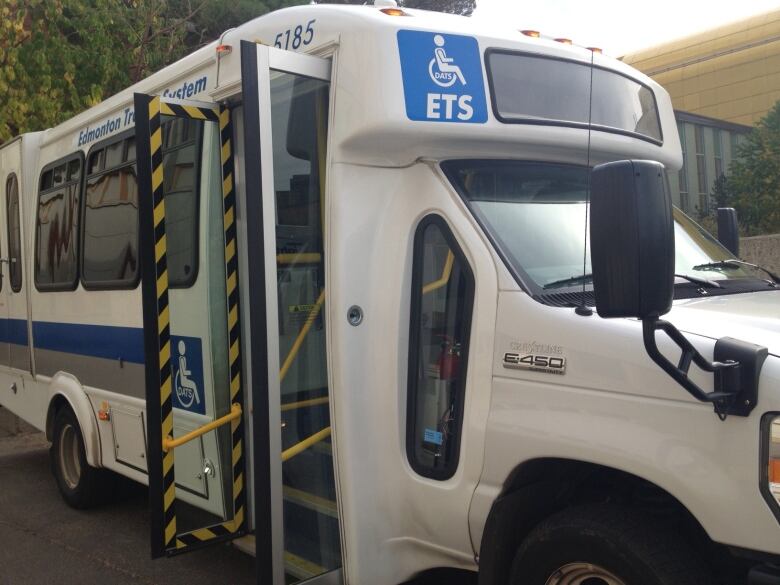There's no getting around Alberta's lack of accessibility law is my ballot box issue
Remove barriers and treat us with dignity, and you'll untap potential of people with disabilities


This column is an opinion by Chris Ryan, a lawyer who lives in Calgary. For more information about CBC's Alberta election 2023 opinion series, visit theMy Priorityhome page.
Getting a job offer at a law firm shortly after a bar call is lucky in the best of times, even more so during the first wave of the COVID pandemic. It was in Sylvan Lake, which a few friends assured me had accessible transportation for wheelchair users like me.
But after moving to the central Alberta town from Edmonton, I made a horrible discovery. Getting on-time, on-demand accessible transportation would require a $120 roundtrip surcharge. That's a higher daily expense than a fresh-off-the-lot Porsche 911.
As badly as I wanted independence, that was a price I could not afford. And it's not just a small-town problem. Big cities aren't much better.
When I worked in Edmonton, my mentor once told me: "If you can't be on time, you can't be a lawyer." When I lived there, Edmonton's transit system for users with disabilities did not let users book by arrival time.
There was no way of knowing when you would arrive at your destination. You could be 30 minutes early for work, 30 minutes late, or sometimes even worse. (Calgary, where I currently live, has a better accessible transit system.)
Neither here nor there
You can fight tooth and nail to get a law degree. You can do everything in your power to become self-sufficient. But as it is now, many cities don't allow people with disabilities to get to work on time. If you live in a rural community and have a disability, you can't get to work at all. At least not without paying an extra $120 every work day.
This is the reality for people with disabilities in Alberta, one of the last Canadian provinces with no comprehensive accessibility legislation.
There are thousands of people on AISH disability benefits who, if given the opportunity, would get off AISH, get a job and start paying taxes.
This would not only save the province from having to pay social support, it would add to the provincial tax pot. It would also be an important step towards treating everybody with dignity.
Provincial accessibility legislation could put Alberta on the path toward achieving those ends.Such legislation could require that all paratransit operators allow users to schedule their trips according to when they need to arrive. This would eliminate the patchwork of municipal approaches we see today, and let people hold a job in Edmonton as well as they can in Calgary and other communities with better service.

In the private sector, accessibility legislation could require that all transportation companies offer accessible transportation in the cities they operate in at no additional charge. This would make $120 round trips a thing of the cruel past.
Alberta's accessibility legislation must also be enforceable, apply to both the public and the private sectors, and have a realistic timeline for achieving provincewide compliance. (Ontario's accessibility law, passed in 2005 has a target of a fully accessible province by 2025.)
Albertans with disabilities are not a chore. We are not some parcel that you can pick up and drop off whenever you get around to it.
We have things to do, we have places to be. We have something to contribute.
We need a hero
I couldn't make it through a single day without the help of everyday heroes. Heroes such as the bus driver and passengers who once got off the bus to help after I fell out of my wheelchair one early winter morning.
But it puzzles me that institutions made of those same heroes fail people with disabilities every day. We are left out in the cold and unable to get to work.
We need a hero that will transform the individual kindness every Albertan has into the institutional kindness that Albertans like meneed.
No matter which party wins, I hope that we have a hero like that in the premier's office.
My Priority
What's the one thing that means the most to you in terms of the provincial election and why is that? We recruited over a dozen residents from across Alberta to answer that question.Read their opinion pieces as they're published at cbc.ca/opinionproject.
Keep in mind, these pieces should not be taken as endorsements of any particular political party by either the writers or the CBC. They are expressions of the writers' points of view, and a look at how those opinions came to be formed.












_(720p).jpg)


 OFFICIAL HD MUSIC VIDEO.jpg)
.jpg)



























































































